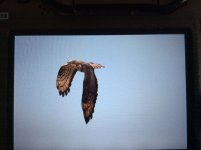dantheman
Bah humbug
Came across this the other day ... the new species Honey-buzzard which I had not encountered before. Bit confused, does the hyphen mean it is a type of honey?
Came across it on a County birding website, although I see the BTO uses it.
Who else commonly uses it within the wider birding community?
Came across it on a County birding website, although I see the BTO uses it.
Who else commonly uses it within the wider birding community?








